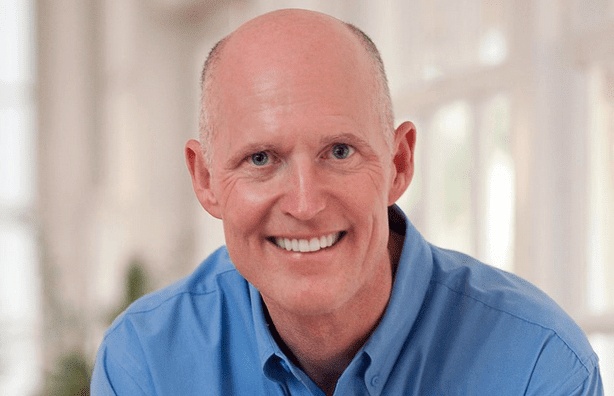The health and budget crisis
You wonder if any staffers at area hospitals had to spend the weekend struggling not with a medical emergency but with a political emergency.
Last Wednesday, Gov. Rick Scott made a “request” to all of Florida’s hospitals for financial and clinical information going back to 2006. He wanted the information by Monday, for review by his Commission on Healthcare and Hospital Funding at its first meeting Wednesday. This would be the commission whose nine members include just one person from the health care industry—an orthopedic and reconstructive surgeon from Gainesville. In his form letter to hospitals and insurers, Scott asked for “information on your services, profits, costs and patient outcomes.”
In roughly a month, Scott has turned his mismanagement of negotiations with the federal government over health care money into a political crisis and an attack on hospitals that support continuation of that money, known as the Low Income Pool (LIP), and expansion of Medicaid under the Affordable Care Act. Rather than referee a dispute between the Florida House and Senate over Medicaid expansion and that LIP money, Scott allowed the House to leave early. The session ended without a budget.
A three-week special session will start June 1. It could last for three weeks. The new budget year starts July 1. The governor is rattling nerves with talk of a potential state government shutdown. Last week, as legislative leaders announced progress in their budget talks, he asked agency leaders for a list of essential services.
Scott also has puzzled and annoyed hospital administrators with his idea that health care facilities should share profits to avoid the need for that LIP money. The share for hospitals is slightly more than $1 billion. The U.S. Department of Health and Human Services has told Scott since 2011 that the money would end unless the state found a better way to spend it than just reimbursing hospitals for emergency room care.
The Obama administration wants to solve that problem by getting health insurance to more Floridians, which supposedly would reduce the use of emergency rooms for non-emergency care. Before 1.6 million Floridians signed up for coverage through the Affordable Care Act exchange, the state had the second-highest rate of uninsured. To cover nearly 900,000 more less-affluent Floridians, the state could use money from the Affordable Care Act, under a Senate plan that would call it the Florida Health Insurance Affordability Exchange, not Medicaid expansion. Scott and the Florida House, however, don’t want to approve anything related to the health care law, which the governor sued to overturn.
The call for profit-sharing is especially odd, since Scott in his former life ran a for-profit hospital company and left with $300 million in stock when the board forced him out during an investigation that resulted in Columbia/HCA being fined $1.7 billion for Medicare and Medicaid fraud. The governor also has a law degree, but he ignored legal issues in asking hospitals to share the wealth.
Boca Raton Regional Hospital, for example, is a non-profit, run by a community-based board. So is Boynton Beach-based Bethesda Health. But West Boca and Delray medical centers are part of investor-owned, for-profit Tenet Healthcare, which a national board oversees. Board members have different obligations to their institution based on the type of institution. What if sharing profits jeopardized bond payments? What about hospitals that— unlike those four—receive direct taxpayer support, not just Medicaid and Medicare money? What about Lakeside Medical Center in Belle Glade, which depends on the Health Care District of Palm Beach County—the only such agency in the state?
Among the four area hospitals, the fight over Low Income Pool money and Medicaid expansion matters least to Boca Regional. According to the Senate, the hospital would lose $935,000 if the LIP money stopped and there was no Medicaid expansion. According to the governor’s figures, Boca Regional made $10.6 million in fiscal year 2014, a total margin of 3.1 percent. The bulk of Boca Regional’s revenue comes from Medicare, not Medicaid.
West Boca and Delray have more to lose. In the same scenario—LIP money stops; the Legislature doesn’t expand Medicaid—West Boca would lose $2.5 million and Delray would lose $2.7 million. Their reported profits for the fiscal year ending Dec. 31, 2013 were $7.6 million and $19.8 million, respectively.
As I wrote last month, though, the fight matters a lot to Bethesda. The company provides a lot of care to uninsured patients, especially pregnant women, and could lose $7.2 million if that federal reimbursement money ends. Bethesda also has the most to gain from Medicaid expansion. Scott’s figures showed Bethesda’s 400-bed main hospital on Seacrest Boulevard losing just under $300,000 for the year that ended Sept. 30, 2014. Bethesda also owns an 80-bed facility west of Boynton.
Scott did not order hospitals to send their information. One wonders, though, if he will keep a list of those that refused. The governor’s health care commission is not serious, but his capacity for trying to dodge blame and make villains of others is real.
Atlantic Crossing
Nothing goes easily when the Delray Beach City Commission discusses Atlantic Crossing. Wednesday night will not break that pattern.
On the commission’s agenda is a recommendation from City Attorney Noel Pfeffer that Delray Beach hire land-use lawyer Debbie Orshefsky—in Pfeffer’s words—“for the task of reviewing the amended development agreement (with Atlantic Crossing) and any proposed settlement agreement with respect to this project.” Mayor Carey Glickstein and Commissioner Jordana Jarjura will agree. Commissioner Shelly Petrolia will not.
It’s all a matter of perspective. Glickstein and Jarjura are lawyers themselves. Glickstein also is a developer. Jarjura is a land-use lawyer. With the goal of getting a site plan for Atlantic Crossing that includes the Atlantic Court easement and a development agreement that protects the city, Glickstein and Jarjura like the idea of hiring Orshefsky, who is nationally known and has spent her career representing developers, mostly in Broward County. Find someone who knows the tricks and the angles. “She would be a great card to have in our pocket,” Jarjura said. The bill would not be more than $15,000.
Petrolia, however, sees Pfeffer’s recommendation of Orshefsky as too exclusive and as his latest in a pattern of controversial actions regarding Atlantic Crossing.
Petrolia starts with the first development agreement that Pfeffer proposed last fall, having been hired in June. (Petrolia voted to hire him.) A lawsuit against Atlantic Crossing was active—the developers since have prevailed— and Petrolia believed that the agreement aligned the city with the developers regarding the litigation. Petrolia also noted the tumultuous Planning and Zoning Board meeting on Atlantic Crossing three months ago—the subject was a new plat—that Pfeffer aborted two hours in because the meeting hadn’t been properly noticed. She believes that Pfeffer all along has been timid in making the case that the city did not give up Atlantic Court in January 2014, when the commission approved a new site plan without the road.
Now Petrolia disagrees with Pfeffer’s choice of Orshefsky because she prefers the Weiss Serota law firm that helped Delray Beach get out of the Waste Management contract, so the city could choose a different, cheaper trash hauler. Because of that work, Petrolia said, the firm “has the public’s trust to deliver good news or bad news” from negotiations over a project that so many Delray Beach residents dislike to varying degrees of intensity. If her previous concerns “shouldn’t give me pause for concern over your single recommendation,” Petrolia wrote in an email to Pfeffer, “shame on me.”
The irony, based on my conversations Monday with Glickstein, Jarjura and Petrolia, is that all three want the same result: Atlantic Court back in the project and the city protected. Example: Atlantic Crossing’s parking will be underground. Glickstein wants the city indemnified if “a Sandy-like storm surge” floods that parking. “This is not just a land-use issue,” Glickstein said. “This is a risk-management issue.”
Glickstein, Jarjura and Petrolia also all dislike Atlantic Crossing—too big, wrong spot—and would not have voted for it in December 2012. Delray Beach, Glickstein said, should have appreciated the location of the property and reduced the zoning years ago, at least the block east of Northeast Seventh Avenue that borders Veterans Park. All realize, however, that Delray Beach at this point can’t change the size and scope of the mixed-use project. Getting the road back in with no other surprises, Petrolia said, “would be worth a victory lap.” Petrolia wonders, though, why only Glickstein, Jarjura and Pfeffer have seen the new preliminary, revised site plan that includes Atlantic Court.
Commissioner Mitch Katz shares Petrolia’s concern about the attorney choice, but he won’t be at Wednesday’s meeting. It was moved from Tuesday at the request of Glickstein and Petrolia, so they could attend a year-end concert at their children’s school.
Petrolia and Katz are right that choosing an attorney—to buttress Glickstein’s negotiations with Atlantic Crossing—is on a tight schedule. But the city needs a resolution before too much more time expires and the city’s position weakens. There’s also precedent for a Palm Beach County city hiring a developers’ lawyer and making it work.
When Nancy Graham was mayor of West Palm Beach, she hired Bob Sanders for the city’s legal department. He had been the builders’ go-to guy, even getting Palm Beach to approve the Esplanade—against all expectations. Sanders then helped West Palm Beach condemn and acquire the land that became CityPlace—also against all expectations. Graham wanted Sanders’ talent on her side, not against her.
Petrolia makes a good case that Pfeffer moved too fast early on regarding Atlantic Crossing. His job, though, is to protect Delray Beach from dangerous legal exposure. Pfeffer is correct that Orshefsky’s qualifications are superb. Since Glickstein, Jarjura and Petrolia agree on the goal, you hope that even as they disagree they can work with Pfeffer on the best way for Delray Beach to get there.
Bridge alert!
If you plan to be in downtown Delray Beach tonight, leave early or plan your departure in a way that doesn’t involve crossing the Atlantic Avenue bridge.
The city advises that the bridge will be closed from 9 p.m. until 5 a.m. Wednesday for maintenance and repairs. Alternatives are the George Bush Boulevard bridge to the north and the Linton Avenue bridge to the south.
••••••••
You can email Randy Schultz at randy@bocamag.com
For more City Watch blogs, click here.About the Author
Randy Schultz was born in Hartford, Conn., and graduated from the University of Tennessee in 1974. He has lived in South Florida since then, and in Boca Raton since 1985. Schultz spent nearly 40 years in daily journalism at the Miami Herald and Palm Beach Post, most recently as editorial page editor at the Post. His wife, Shelley, is director of The Learning Network at Pine Crest School. His son, an attorney, and daughter-in-law and three grandchildren also live in Boca Raton. His daughter is a veterinarian who lives in Baltimore.








